Organisational Behaviour Report: M&S and Effective Team Dynamics
VerifiedAdded on 2023/01/18
|14
|4237
|36
Report
AI Summary
This report provides an analysis of organisational behaviour, focusing on the case of Marks & Spencer (M&S). It explores the impact of organisational culture, politics, and power on individual and team behaviour, utilising Handy's cultural model to assess M&S's culture. The report also evaluates content and process theories of motivation, including Maslow's hierarchy of needs and equity theory, and how motivational techniques enable effective goal achievement. The report further examines the characteristics of effective and ineffective teams, and the relevance of team development. Finally, it reflects on the concepts and philosophies of organisational behaviour, offering recommendations for M&S to enhance employee motivation and organisational success. The report is structured into two parts, Task 1 focusing on the influence of culture, politics and power and motivational techniques and Part 2 discussing team effectiveness and application of organisational behaviour concepts.
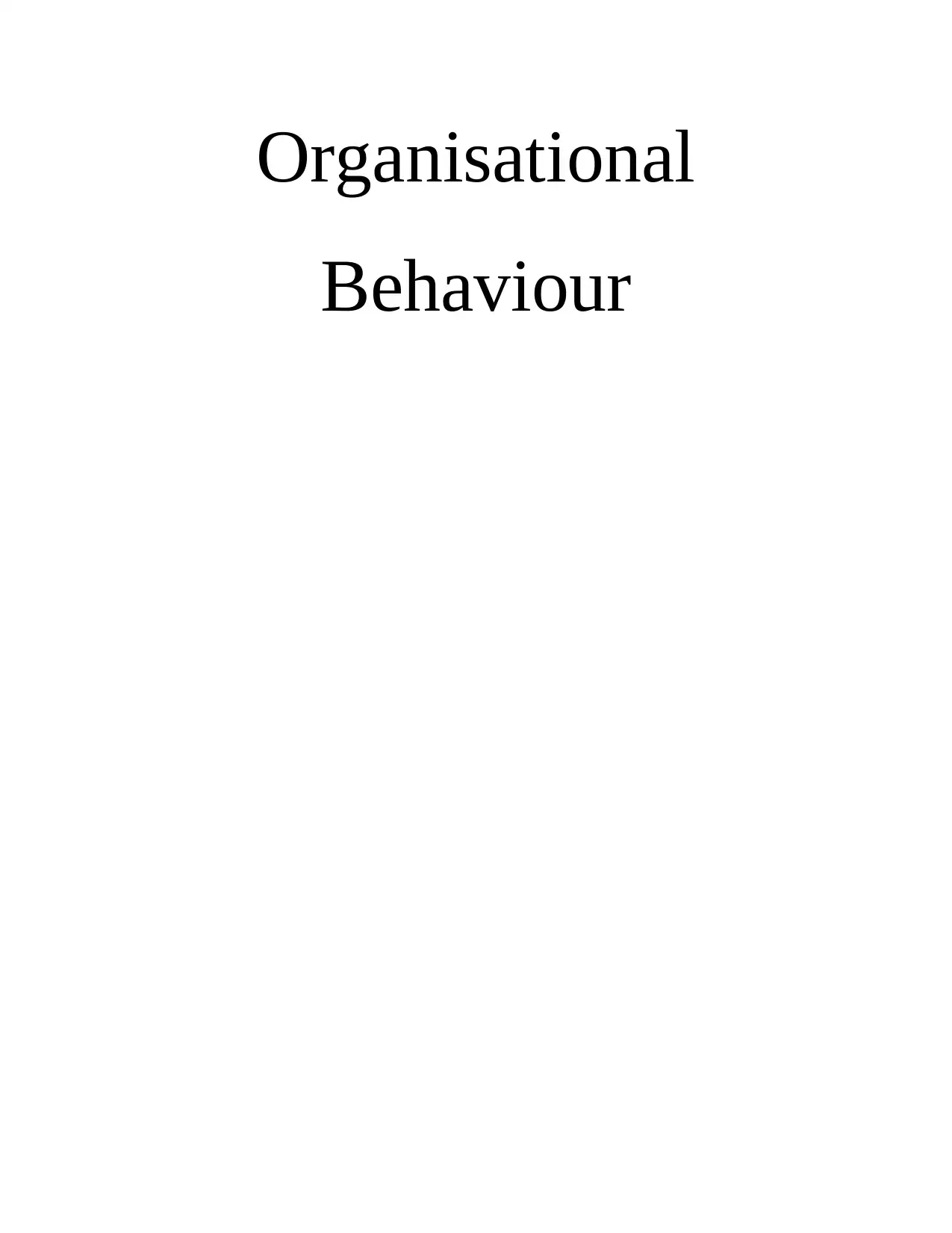
Organisational
Behaviour
Behaviour
Paraphrase This Document
Need a fresh take? Get an instant paraphrase of this document with our AI Paraphraser
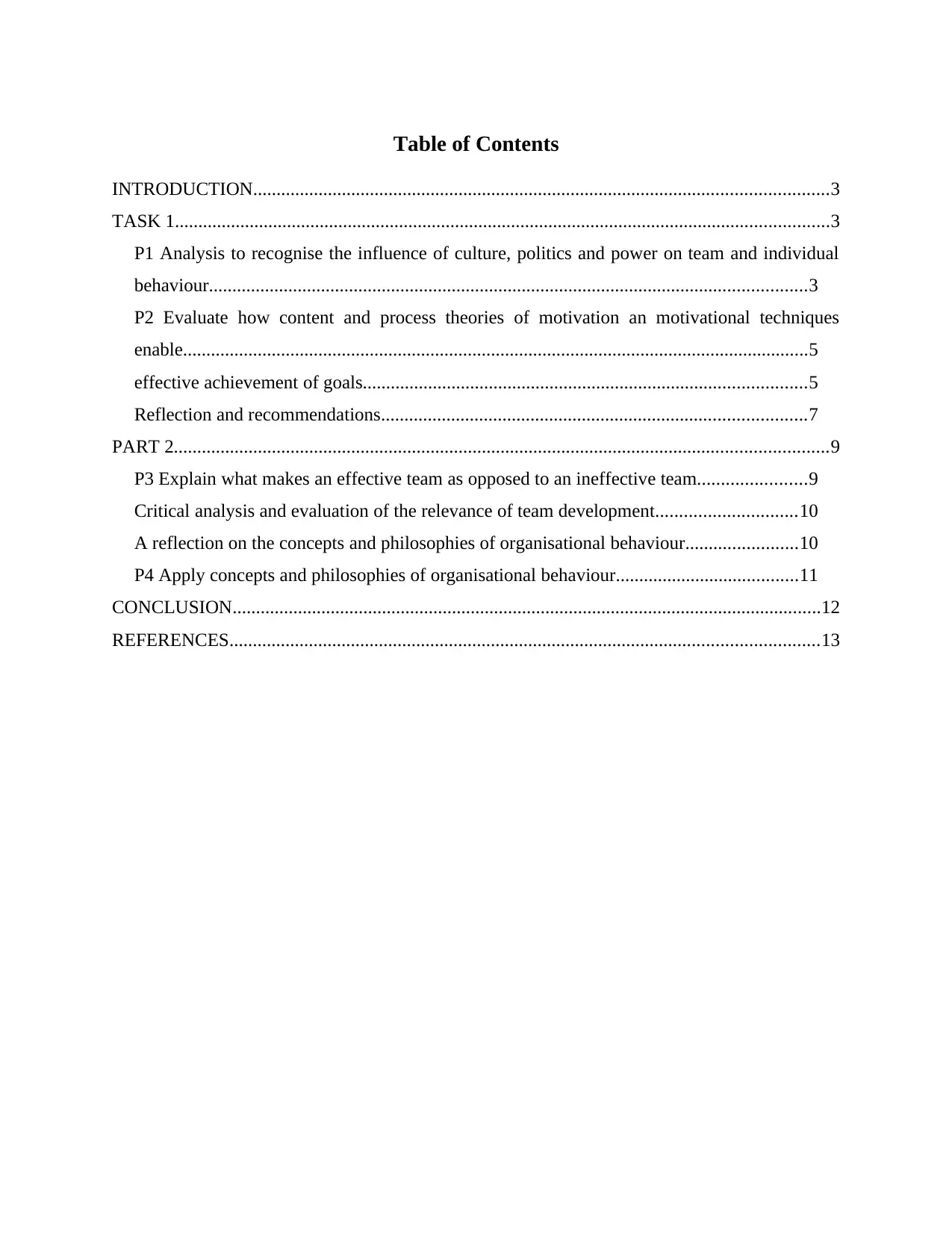
Table of Contents
INTRODUCTION...........................................................................................................................3
TASK 1............................................................................................................................................3
P1 Analysis to recognise the influence of culture, politics and power on team and individual
behaviour................................................................................................................................3
P2 Evaluate how content and process theories of motivation an motivational techniques
enable......................................................................................................................................5
effective achievement of goals...............................................................................................5
Reflection and recommendations...........................................................................................7
PART 2............................................................................................................................................9
P3 Explain what makes an effective team as opposed to an ineffective team.......................9
Critical analysis and evaluation of the relevance of team development..............................10
A reflection on the concepts and philosophies of organisational behaviour........................10
P4 Apply concepts and philosophies of organisational behaviour.......................................11
CONCLUSION..............................................................................................................................12
REFERENCES..............................................................................................................................13
INTRODUCTION...........................................................................................................................3
TASK 1............................................................................................................................................3
P1 Analysis to recognise the influence of culture, politics and power on team and individual
behaviour................................................................................................................................3
P2 Evaluate how content and process theories of motivation an motivational techniques
enable......................................................................................................................................5
effective achievement of goals...............................................................................................5
Reflection and recommendations...........................................................................................7
PART 2............................................................................................................................................9
P3 Explain what makes an effective team as opposed to an ineffective team.......................9
Critical analysis and evaluation of the relevance of team development..............................10
A reflection on the concepts and philosophies of organisational behaviour........................10
P4 Apply concepts and philosophies of organisational behaviour.......................................11
CONCLUSION..............................................................................................................................12
REFERENCES..............................................................................................................................13
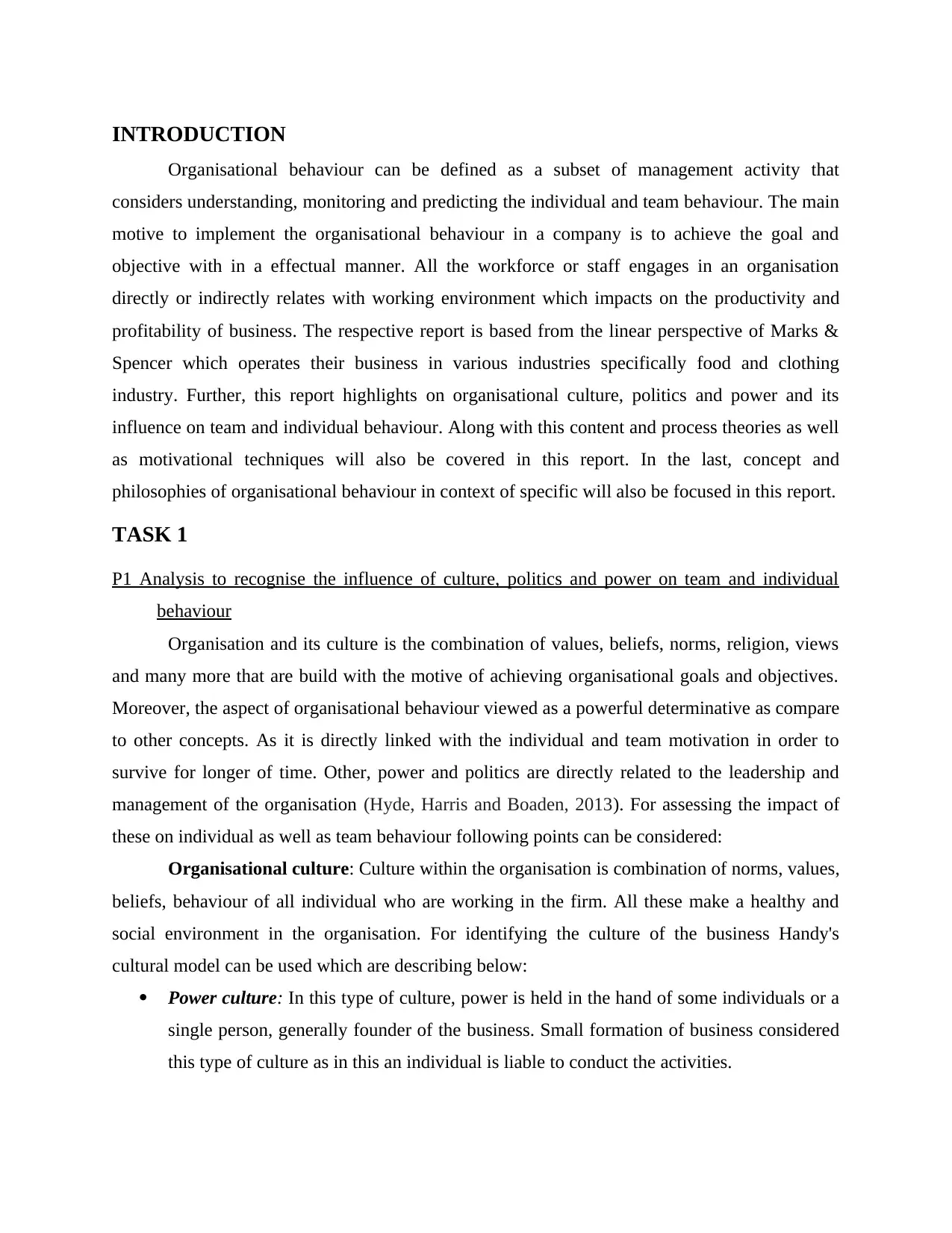
INTRODUCTION
Organisational behaviour can be defined as a subset of management activity that
considers understanding, monitoring and predicting the individual and team behaviour. The main
motive to implement the organisational behaviour in a company is to achieve the goal and
objective with in a effectual manner. All the workforce or staff engages in an organisation
directly or indirectly relates with working environment which impacts on the productivity and
profitability of business. The respective report is based from the linear perspective of Marks &
Spencer which operates their business in various industries specifically food and clothing
industry. Further, this report highlights on organisational culture, politics and power and its
influence on team and individual behaviour. Along with this content and process theories as well
as motivational techniques will also be covered in this report. In the last, concept and
philosophies of organisational behaviour in context of specific will also be focused in this report.
TASK 1
P1 Analysis to recognise the influence of culture, politics and power on team and individual
behaviour
Organisation and its culture is the combination of values, beliefs, norms, religion, views
and many more that are build with the motive of achieving organisational goals and objectives.
Moreover, the aspect of organisational behaviour viewed as a powerful determinative as compare
to other concepts. As it is directly linked with the individual and team motivation in order to
survive for longer of time. Other, power and politics are directly related to the leadership and
management of the organisation (Hyde, Harris and Boaden, 2013). For assessing the impact of
these on individual as well as team behaviour following points can be considered:
Organisational culture: Culture within the organisation is combination of norms, values,
beliefs, behaviour of all individual who are working in the firm. All these make a healthy and
social environment in the organisation. For identifying the culture of the business Handy's
cultural model can be used which are describing below:
Power culture: In this type of culture, power is held in the hand of some individuals or a
single person, generally founder of the business. Small formation of business considered
this type of culture as in this an individual is liable to conduct the activities.
Organisational behaviour can be defined as a subset of management activity that
considers understanding, monitoring and predicting the individual and team behaviour. The main
motive to implement the organisational behaviour in a company is to achieve the goal and
objective with in a effectual manner. All the workforce or staff engages in an organisation
directly or indirectly relates with working environment which impacts on the productivity and
profitability of business. The respective report is based from the linear perspective of Marks &
Spencer which operates their business in various industries specifically food and clothing
industry. Further, this report highlights on organisational culture, politics and power and its
influence on team and individual behaviour. Along with this content and process theories as well
as motivational techniques will also be covered in this report. In the last, concept and
philosophies of organisational behaviour in context of specific will also be focused in this report.
TASK 1
P1 Analysis to recognise the influence of culture, politics and power on team and individual
behaviour
Organisation and its culture is the combination of values, beliefs, norms, religion, views
and many more that are build with the motive of achieving organisational goals and objectives.
Moreover, the aspect of organisational behaviour viewed as a powerful determinative as compare
to other concepts. As it is directly linked with the individual and team motivation in order to
survive for longer of time. Other, power and politics are directly related to the leadership and
management of the organisation (Hyde, Harris and Boaden, 2013). For assessing the impact of
these on individual as well as team behaviour following points can be considered:
Organisational culture: Culture within the organisation is combination of norms, values,
beliefs, behaviour of all individual who are working in the firm. All these make a healthy and
social environment in the organisation. For identifying the culture of the business Handy's
cultural model can be used which are describing below:
Power culture: In this type of culture, power is held in the hand of some individuals or a
single person, generally founder of the business. Small formation of business considered
this type of culture as in this an individual is liable to conduct the activities.
⊘ This is a preview!⊘
Do you want full access?
Subscribe today to unlock all pages.

Trusted by 1+ million students worldwide
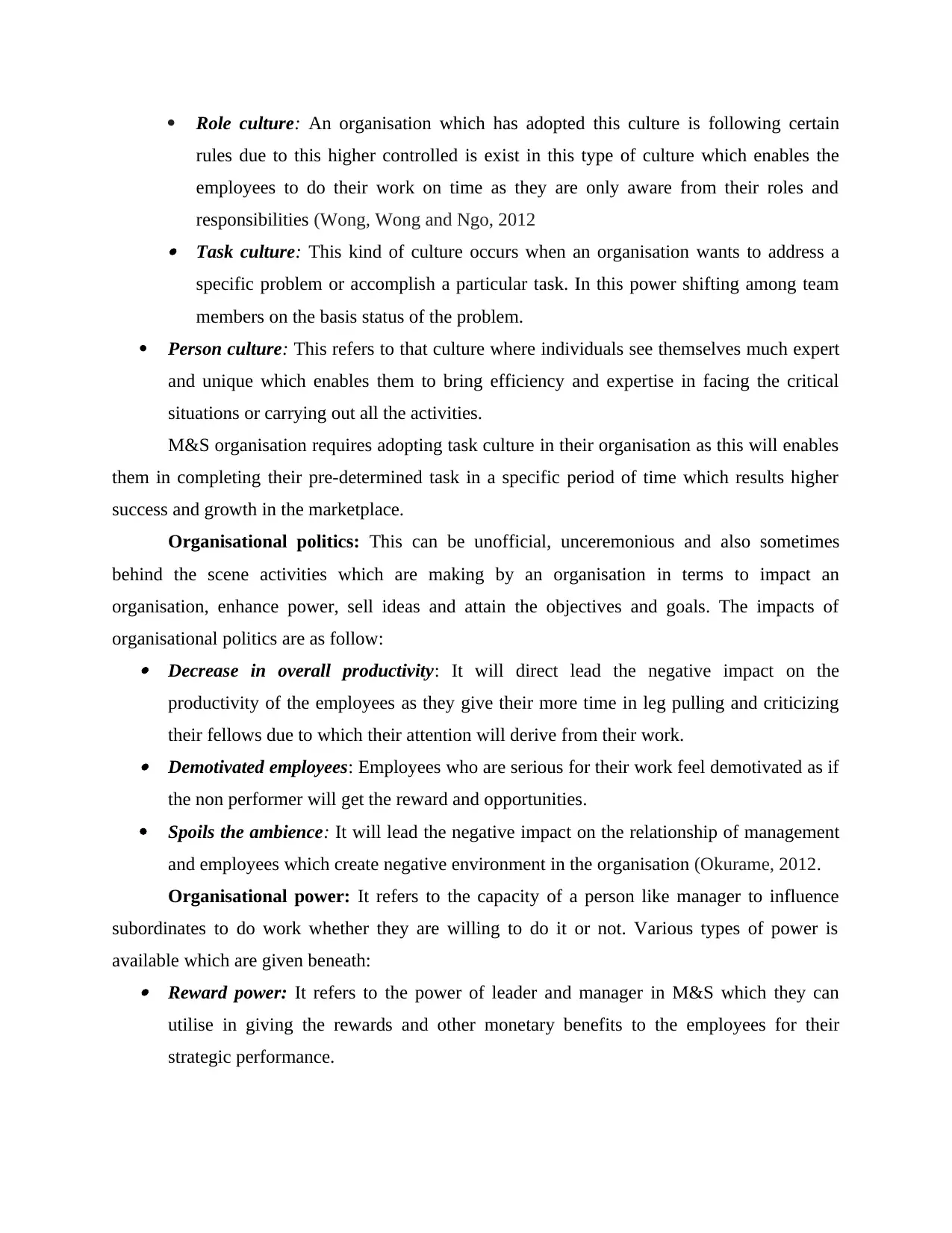
Role culture: An organisation which has adopted this culture is following certain
rules due to this higher controlled is exist in this type of culture which enables the
employees to do their work on time as they are only aware from their roles and
responsibilities (Wong, Wong and Ngo, 2012
Task culture: This kind of culture occurs when an organisation wants to address a
specific problem or accomplish a particular task. In this power shifting among team
members on the basis status of the problem.
Person culture: This refers to that culture where individuals see themselves much expert
and unique which enables them to bring efficiency and expertise in facing the critical
situations or carrying out all the activities.
M&S organisation requires adopting task culture in their organisation as this will enables
them in completing their pre-determined task in a specific period of time which results higher
success and growth in the marketplace.
Organisational politics: This can be unofficial, unceremonious and also sometimes
behind the scene activities which are making by an organisation in terms to impact an
organisation, enhance power, sell ideas and attain the objectives and goals. The impacts of
organisational politics are as follow: Decrease in overall productivity: It will direct lead the negative impact on the
productivity of the employees as they give their more time in leg pulling and criticizing
their fellows due to which their attention will derive from their work. Demotivated employees: Employees who are serious for their work feel demotivated as if
the non performer will get the reward and opportunities.
Spoils the ambience: It will lead the negative impact on the relationship of management
and employees which create negative environment in the organisation (Okurame, 2012.
Organisational power: It refers to the capacity of a person like manager to influence
subordinates to do work whether they are willing to do it or not. Various types of power is
available which are given beneath: Reward power: It refers to the power of leader and manager in M&S which they can
utilise in giving the rewards and other monetary benefits to the employees for their
strategic performance.
rules due to this higher controlled is exist in this type of culture which enables the
employees to do their work on time as they are only aware from their roles and
responsibilities (Wong, Wong and Ngo, 2012
Task culture: This kind of culture occurs when an organisation wants to address a
specific problem or accomplish a particular task. In this power shifting among team
members on the basis status of the problem.
Person culture: This refers to that culture where individuals see themselves much expert
and unique which enables them to bring efficiency and expertise in facing the critical
situations or carrying out all the activities.
M&S organisation requires adopting task culture in their organisation as this will enables
them in completing their pre-determined task in a specific period of time which results higher
success and growth in the marketplace.
Organisational politics: This can be unofficial, unceremonious and also sometimes
behind the scene activities which are making by an organisation in terms to impact an
organisation, enhance power, sell ideas and attain the objectives and goals. The impacts of
organisational politics are as follow: Decrease in overall productivity: It will direct lead the negative impact on the
productivity of the employees as they give their more time in leg pulling and criticizing
their fellows due to which their attention will derive from their work. Demotivated employees: Employees who are serious for their work feel demotivated as if
the non performer will get the reward and opportunities.
Spoils the ambience: It will lead the negative impact on the relationship of management
and employees which create negative environment in the organisation (Okurame, 2012.
Organisational power: It refers to the capacity of a person like manager to influence
subordinates to do work whether they are willing to do it or not. Various types of power is
available which are given beneath: Reward power: It refers to the power of leader and manager in M&S which they can
utilise in giving the rewards and other monetary benefits to the employees for their
strategic performance.
Paraphrase This Document
Need a fresh take? Get an instant paraphrase of this document with our AI Paraphraser
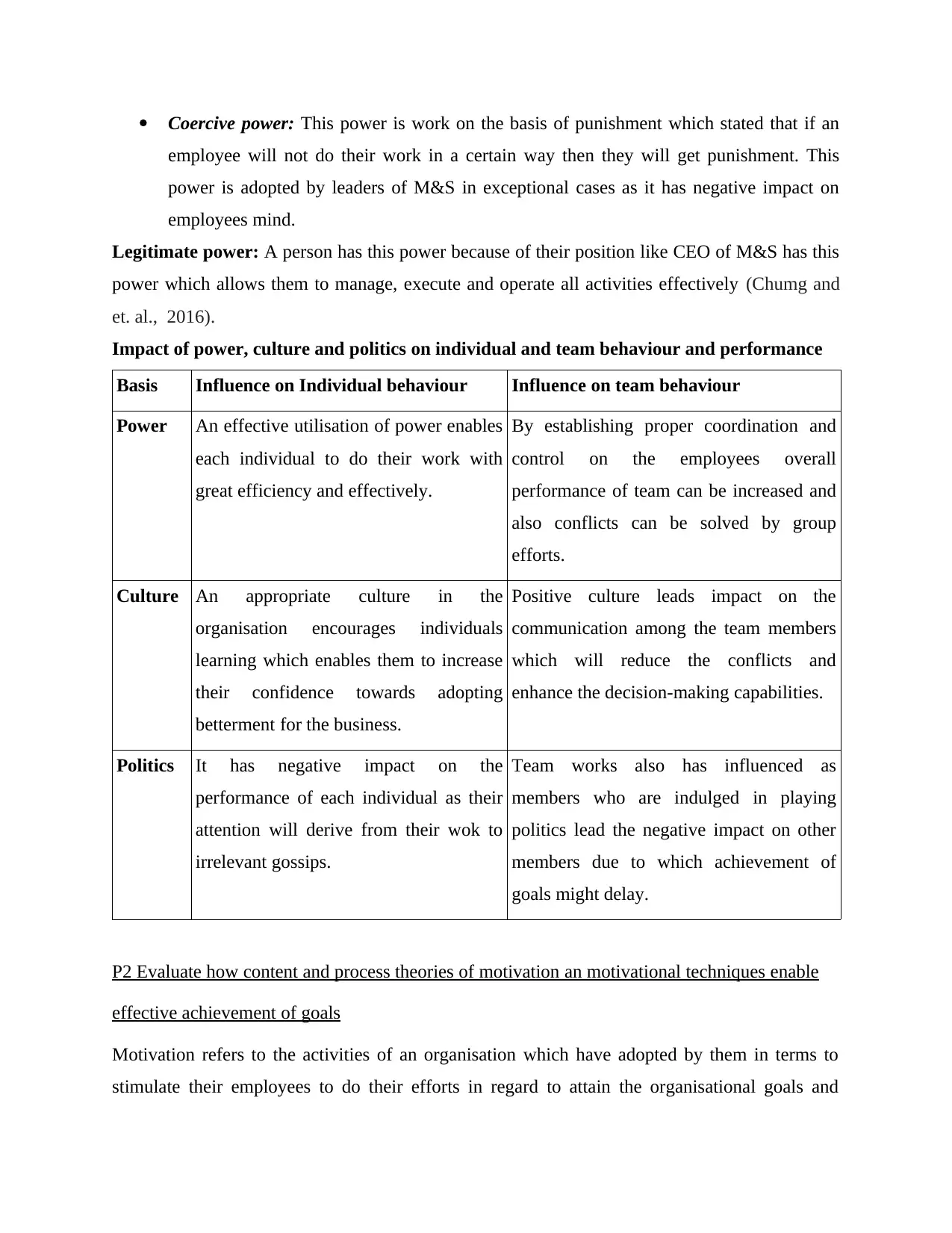
Coercive power: This power is work on the basis of punishment which stated that if an
employee will not do their work in a certain way then they will get punishment. This
power is adopted by leaders of M&S in exceptional cases as it has negative impact on
employees mind.
Legitimate power: A person has this power because of their position like CEO of M&S has this
power which allows them to manage, execute and operate all activities effectively (Chumg and
et. al., 2016).
Impact of power, culture and politics on individual and team behaviour and performance
Basis Influence on Individual behaviour Influence on team behaviour
Power An effective utilisation of power enables
each individual to do their work with
great efficiency and effectively.
By establishing proper coordination and
control on the employees overall
performance of team can be increased and
also conflicts can be solved by group
efforts.
Culture An appropriate culture in the
organisation encourages individuals
learning which enables them to increase
their confidence towards adopting
betterment for the business.
Positive culture leads impact on the
communication among the team members
which will reduce the conflicts and
enhance the decision-making capabilities.
Politics It has negative impact on the
performance of each individual as their
attention will derive from their wok to
irrelevant gossips.
Team works also has influenced as
members who are indulged in playing
politics lead the negative impact on other
members due to which achievement of
goals might delay.
P2 Evaluate how content and process theories of motivation an motivational techniques enable
effective achievement of goals
Motivation refers to the activities of an organisation which have adopted by them in terms to
stimulate their employees to do their efforts in regard to attain the organisational goals and
employee will not do their work in a certain way then they will get punishment. This
power is adopted by leaders of M&S in exceptional cases as it has negative impact on
employees mind.
Legitimate power: A person has this power because of their position like CEO of M&S has this
power which allows them to manage, execute and operate all activities effectively (Chumg and
et. al., 2016).
Impact of power, culture and politics on individual and team behaviour and performance
Basis Influence on Individual behaviour Influence on team behaviour
Power An effective utilisation of power enables
each individual to do their work with
great efficiency and effectively.
By establishing proper coordination and
control on the employees overall
performance of team can be increased and
also conflicts can be solved by group
efforts.
Culture An appropriate culture in the
organisation encourages individuals
learning which enables them to increase
their confidence towards adopting
betterment for the business.
Positive culture leads impact on the
communication among the team members
which will reduce the conflicts and
enhance the decision-making capabilities.
Politics It has negative impact on the
performance of each individual as their
attention will derive from their wok to
irrelevant gossips.
Team works also has influenced as
members who are indulged in playing
politics lead the negative impact on other
members due to which achievement of
goals might delay.
P2 Evaluate how content and process theories of motivation an motivational techniques enable
effective achievement of goals
Motivation refers to the activities of an organisation which have adopted by them in terms to
stimulate their employees to do their efforts in regard to attain the organisational goals and
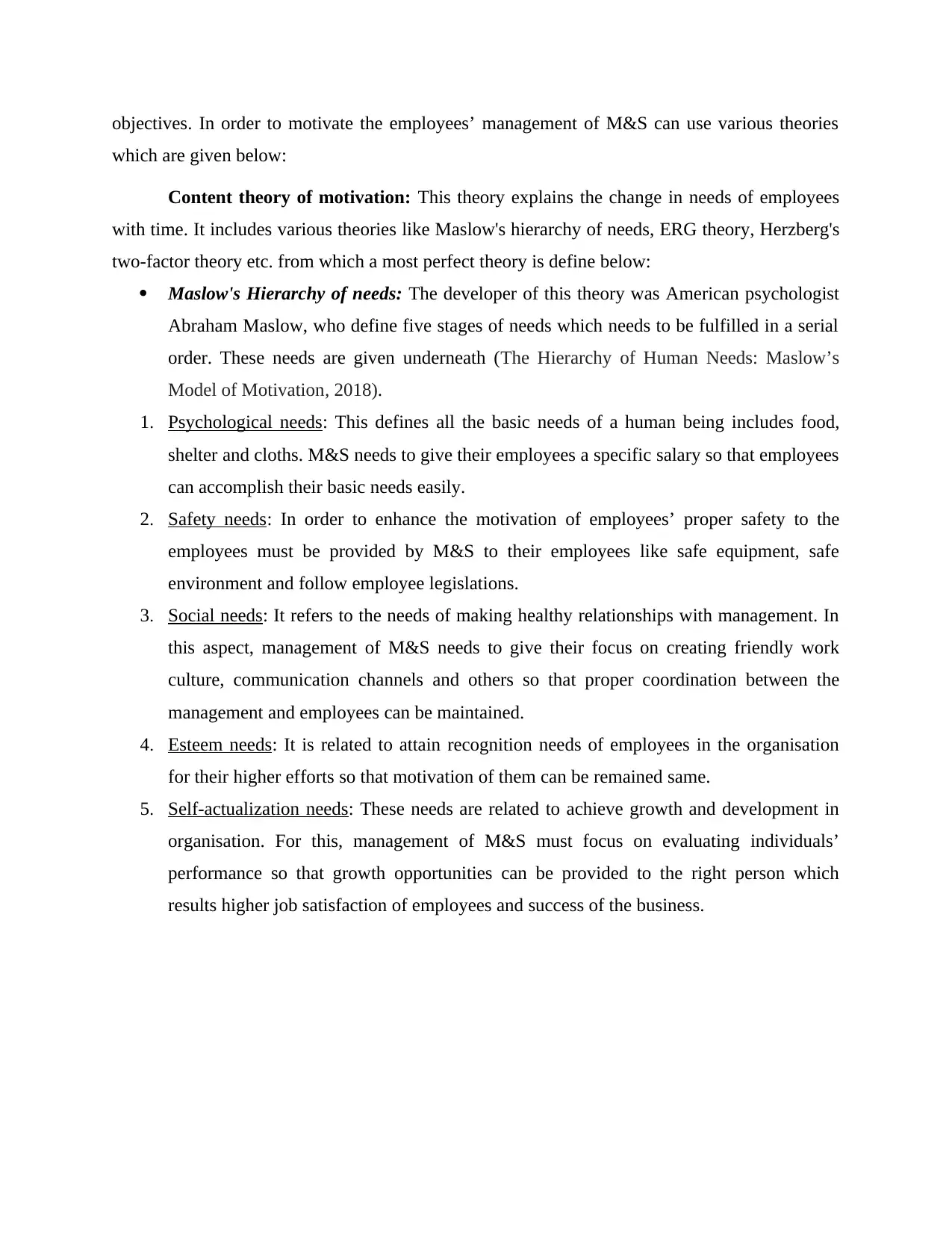
objectives. In order to motivate the employees’ management of M&S can use various theories
which are given below:
Content theory of motivation: This theory explains the change in needs of employees
with time. It includes various theories like Maslow's hierarchy of needs, ERG theory, Herzberg's
two-factor theory etc. from which a most perfect theory is define below:
Maslow's Hierarchy of needs: The developer of this theory was American psychologist
Abraham Maslow, who define five stages of needs which needs to be fulfilled in a serial
order. These needs are given underneath (The Hierarchy of Human Needs: Maslow’s
Model of Motivation, 2018).
1. Psychological needs: This defines all the basic needs of a human being includes food,
shelter and cloths. M&S needs to give their employees a specific salary so that employees
can accomplish their basic needs easily.
2. Safety needs: In order to enhance the motivation of employees’ proper safety to the
employees must be provided by M&S to their employees like safe equipment, safe
environment and follow employee legislations.
3. Social needs: It refers to the needs of making healthy relationships with management. In
this aspect, management of M&S needs to give their focus on creating friendly work
culture, communication channels and others so that proper coordination between the
management and employees can be maintained.
4. Esteem needs: It is related to attain recognition needs of employees in the organisation
for their higher efforts so that motivation of them can be remained same.
5. Self-actualization needs: These needs are related to achieve growth and development in
organisation. For this, management of M&S must focus on evaluating individuals’
performance so that growth opportunities can be provided to the right person which
results higher job satisfaction of employees and success of the business.
which are given below:
Content theory of motivation: This theory explains the change in needs of employees
with time. It includes various theories like Maslow's hierarchy of needs, ERG theory, Herzberg's
two-factor theory etc. from which a most perfect theory is define below:
Maslow's Hierarchy of needs: The developer of this theory was American psychologist
Abraham Maslow, who define five stages of needs which needs to be fulfilled in a serial
order. These needs are given underneath (The Hierarchy of Human Needs: Maslow’s
Model of Motivation, 2018).
1. Psychological needs: This defines all the basic needs of a human being includes food,
shelter and cloths. M&S needs to give their employees a specific salary so that employees
can accomplish their basic needs easily.
2. Safety needs: In order to enhance the motivation of employees’ proper safety to the
employees must be provided by M&S to their employees like safe equipment, safe
environment and follow employee legislations.
3. Social needs: It refers to the needs of making healthy relationships with management. In
this aspect, management of M&S needs to give their focus on creating friendly work
culture, communication channels and others so that proper coordination between the
management and employees can be maintained.
4. Esteem needs: It is related to attain recognition needs of employees in the organisation
for their higher efforts so that motivation of them can be remained same.
5. Self-actualization needs: These needs are related to achieve growth and development in
organisation. For this, management of M&S must focus on evaluating individuals’
performance so that growth opportunities can be provided to the right person which
results higher job satisfaction of employees and success of the business.
⊘ This is a preview!⊘
Do you want full access?
Subscribe today to unlock all pages.

Trusted by 1+ million students worldwide
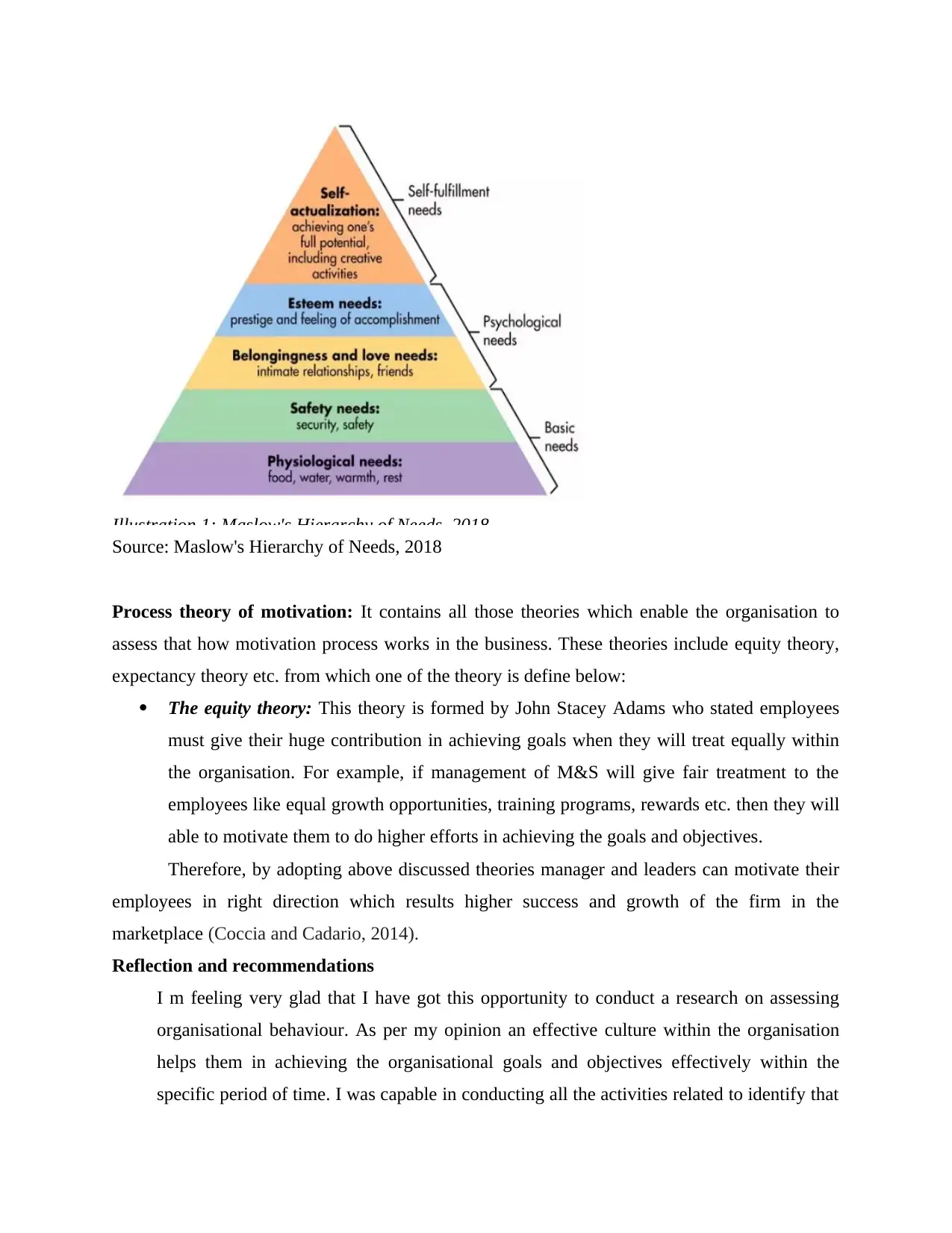
Illustration 1: Maslow's Hierarchy of Needs. 2018
Source: Maslow's Hierarchy of Needs, 2018
Process theory of motivation: It contains all those theories which enable the organisation to
assess that how motivation process works in the business. These theories include equity theory,
expectancy theory etc. from which one of the theory is define below:
The equity theory: This theory is formed by John Stacey Adams who stated employees
must give their huge contribution in achieving goals when they will treat equally within
the organisation. For example, if management of M&S will give fair treatment to the
employees like equal growth opportunities, training programs, rewards etc. then they will
able to motivate them to do higher efforts in achieving the goals and objectives.
Therefore, by adopting above discussed theories manager and leaders can motivate their
employees in right direction which results higher success and growth of the firm in the
marketplace (Coccia and Cadario, 2014).
Reflection and recommendations
I m feeling very glad that I have got this opportunity to conduct a research on assessing
organisational behaviour. As per my opinion an effective culture within the organisation
helps them in achieving the organisational goals and objectives effectively within the
specific period of time. I was capable in conducting all the activities related to identify that
Source: Maslow's Hierarchy of Needs, 2018
Process theory of motivation: It contains all those theories which enable the organisation to
assess that how motivation process works in the business. These theories include equity theory,
expectancy theory etc. from which one of the theory is define below:
The equity theory: This theory is formed by John Stacey Adams who stated employees
must give their huge contribution in achieving goals when they will treat equally within
the organisation. For example, if management of M&S will give fair treatment to the
employees like equal growth opportunities, training programs, rewards etc. then they will
able to motivate them to do higher efforts in achieving the goals and objectives.
Therefore, by adopting above discussed theories manager and leaders can motivate their
employees in right direction which results higher success and growth of the firm in the
marketplace (Coccia and Cadario, 2014).
Reflection and recommendations
I m feeling very glad that I have got this opportunity to conduct a research on assessing
organisational behaviour. As per my opinion an effective culture within the organisation
helps them in achieving the organisational goals and objectives effectively within the
specific period of time. I was capable in conducting all the activities related to identify that
Paraphrase This Document
Need a fresh take? Get an instant paraphrase of this document with our AI Paraphraser
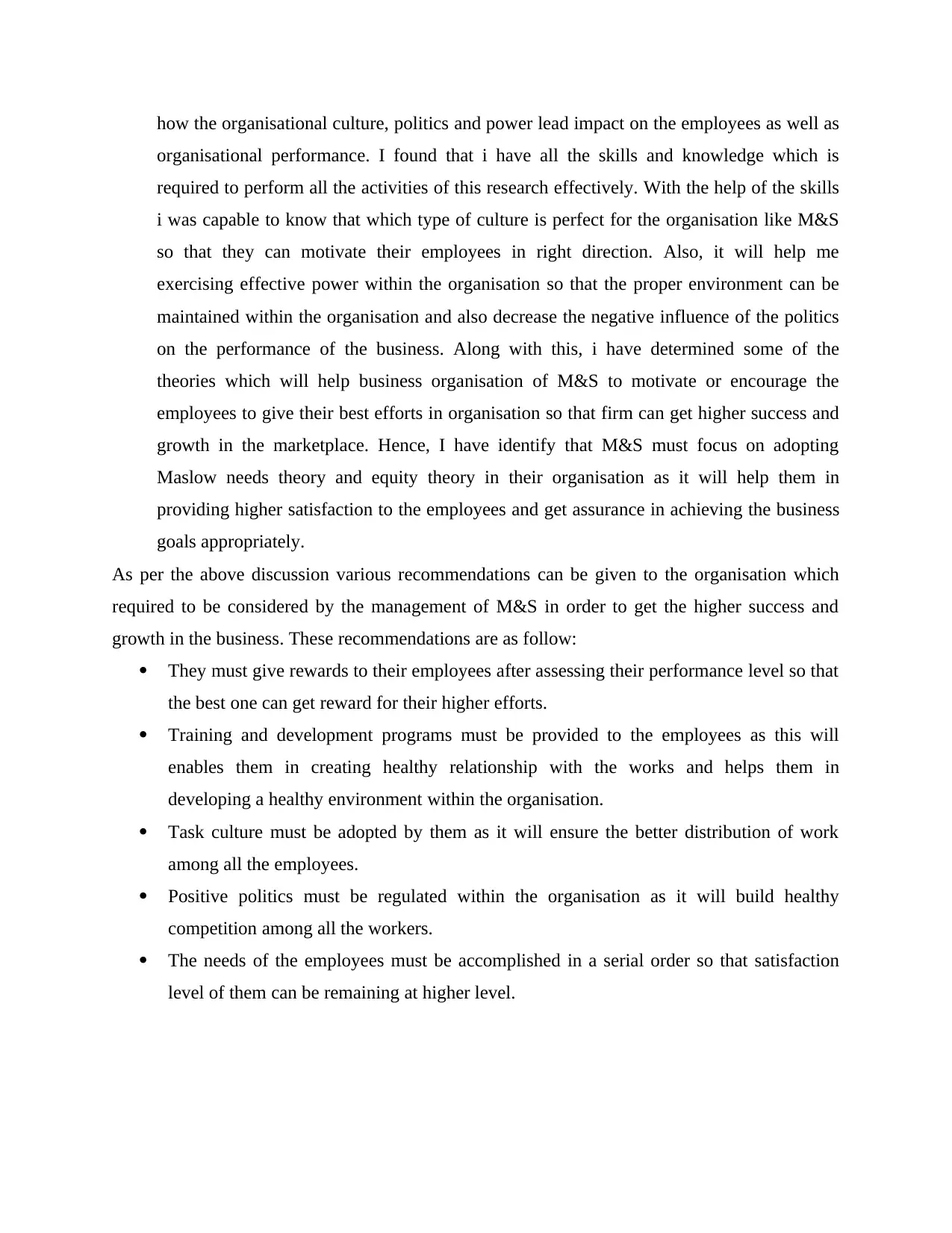
how the organisational culture, politics and power lead impact on the employees as well as
organisational performance. I found that i have all the skills and knowledge which is
required to perform all the activities of this research effectively. With the help of the skills
i was capable to know that which type of culture is perfect for the organisation like M&S
so that they can motivate their employees in right direction. Also, it will help me
exercising effective power within the organisation so that the proper environment can be
maintained within the organisation and also decrease the negative influence of the politics
on the performance of the business. Along with this, i have determined some of the
theories which will help business organisation of M&S to motivate or encourage the
employees to give their best efforts in organisation so that firm can get higher success and
growth in the marketplace. Hence, I have identify that M&S must focus on adopting
Maslow needs theory and equity theory in their organisation as it will help them in
providing higher satisfaction to the employees and get assurance in achieving the business
goals appropriately.
As per the above discussion various recommendations can be given to the organisation which
required to be considered by the management of M&S in order to get the higher success and
growth in the business. These recommendations are as follow:
They must give rewards to their employees after assessing their performance level so that
the best one can get reward for their higher efforts.
Training and development programs must be provided to the employees as this will
enables them in creating healthy relationship with the works and helps them in
developing a healthy environment within the organisation.
Task culture must be adopted by them as it will ensure the better distribution of work
among all the employees.
Positive politics must be regulated within the organisation as it will build healthy
competition among all the workers.
The needs of the employees must be accomplished in a serial order so that satisfaction
level of them can be remaining at higher level.
organisational performance. I found that i have all the skills and knowledge which is
required to perform all the activities of this research effectively. With the help of the skills
i was capable to know that which type of culture is perfect for the organisation like M&S
so that they can motivate their employees in right direction. Also, it will help me
exercising effective power within the organisation so that the proper environment can be
maintained within the organisation and also decrease the negative influence of the politics
on the performance of the business. Along with this, i have determined some of the
theories which will help business organisation of M&S to motivate or encourage the
employees to give their best efforts in organisation so that firm can get higher success and
growth in the marketplace. Hence, I have identify that M&S must focus on adopting
Maslow needs theory and equity theory in their organisation as it will help them in
providing higher satisfaction to the employees and get assurance in achieving the business
goals appropriately.
As per the above discussion various recommendations can be given to the organisation which
required to be considered by the management of M&S in order to get the higher success and
growth in the business. These recommendations are as follow:
They must give rewards to their employees after assessing their performance level so that
the best one can get reward for their higher efforts.
Training and development programs must be provided to the employees as this will
enables them in creating healthy relationship with the works and helps them in
developing a healthy environment within the organisation.
Task culture must be adopted by them as it will ensure the better distribution of work
among all the employees.
Positive politics must be regulated within the organisation as it will build healthy
competition among all the workers.
The needs of the employees must be accomplished in a serial order so that satisfaction
level of them can be remaining at higher level.
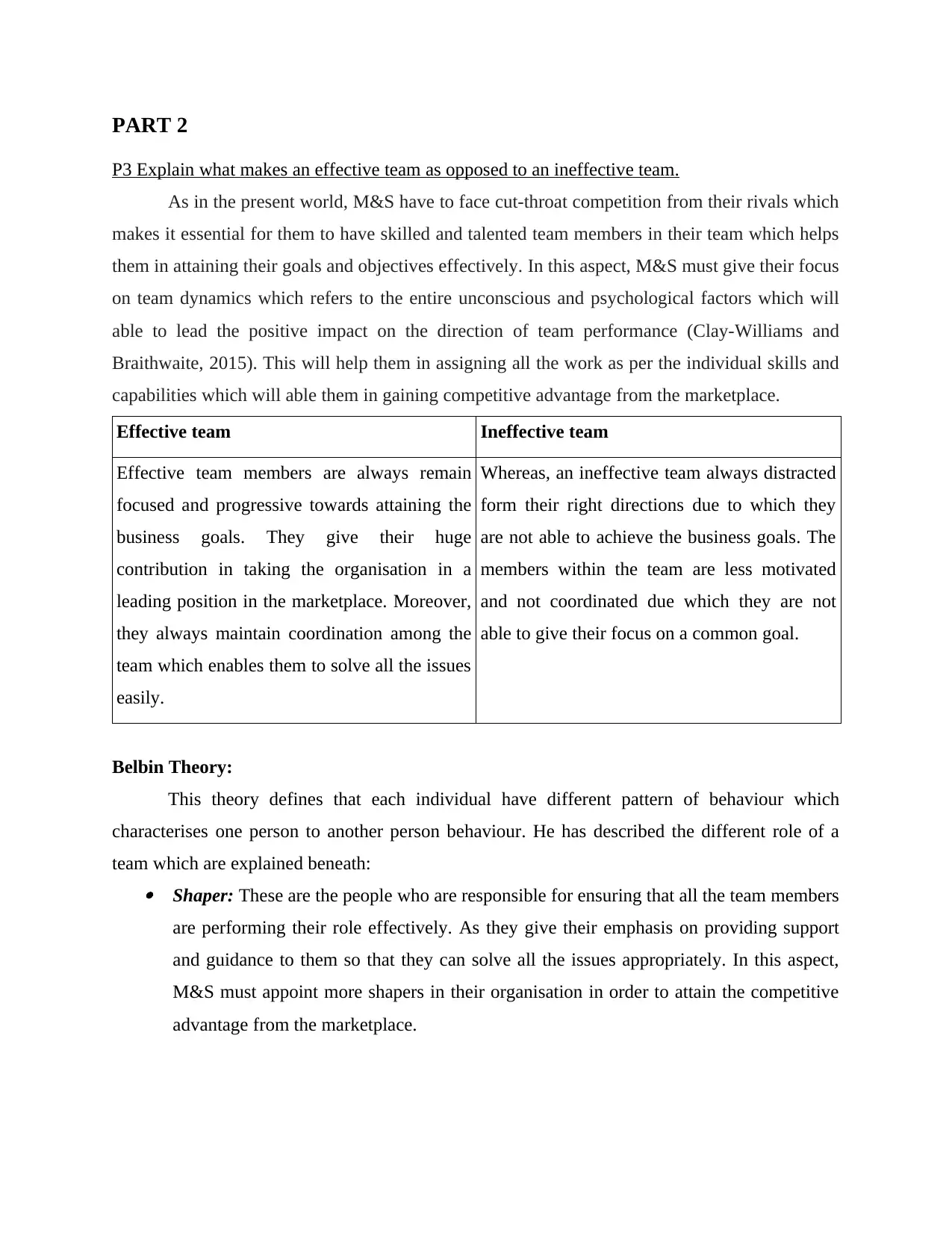
PART 2
P3 Explain what makes an effective team as opposed to an ineffective team.
As in the present world, M&S have to face cut-throat competition from their rivals which
makes it essential for them to have skilled and talented team members in their team which helps
them in attaining their goals and objectives effectively. In this aspect, M&S must give their focus
on team dynamics which refers to the entire unconscious and psychological factors which will
able to lead the positive impact on the direction of team performance (Clay-Williams and
Braithwaite, 2015). This will help them in assigning all the work as per the individual skills and
capabilities which will able them in gaining competitive advantage from the marketplace.
Effective team Ineffective team
Effective team members are always remain
focused and progressive towards attaining the
business goals. They give their huge
contribution in taking the organisation in a
leading position in the marketplace. Moreover,
they always maintain coordination among the
team which enables them to solve all the issues
easily.
Whereas, an ineffective team always distracted
form their right directions due to which they
are not able to achieve the business goals. The
members within the team are less motivated
and not coordinated due which they are not
able to give their focus on a common goal.
Belbin Theory:
This theory defines that each individual have different pattern of behaviour which
characterises one person to another person behaviour. He has described the different role of a
team which are explained beneath: Shaper: These are the people who are responsible for ensuring that all the team members
are performing their role effectively. As they give their emphasis on providing support
and guidance to them so that they can solve all the issues appropriately. In this aspect,
M&S must appoint more shapers in their organisation in order to attain the competitive
advantage from the marketplace.
P3 Explain what makes an effective team as opposed to an ineffective team.
As in the present world, M&S have to face cut-throat competition from their rivals which
makes it essential for them to have skilled and talented team members in their team which helps
them in attaining their goals and objectives effectively. In this aspect, M&S must give their focus
on team dynamics which refers to the entire unconscious and psychological factors which will
able to lead the positive impact on the direction of team performance (Clay-Williams and
Braithwaite, 2015). This will help them in assigning all the work as per the individual skills and
capabilities which will able them in gaining competitive advantage from the marketplace.
Effective team Ineffective team
Effective team members are always remain
focused and progressive towards attaining the
business goals. They give their huge
contribution in taking the organisation in a
leading position in the marketplace. Moreover,
they always maintain coordination among the
team which enables them to solve all the issues
easily.
Whereas, an ineffective team always distracted
form their right directions due to which they
are not able to achieve the business goals. The
members within the team are less motivated
and not coordinated due which they are not
able to give their focus on a common goal.
Belbin Theory:
This theory defines that each individual have different pattern of behaviour which
characterises one person to another person behaviour. He has described the different role of a
team which are explained beneath: Shaper: These are the people who are responsible for ensuring that all the team members
are performing their role effectively. As they give their emphasis on providing support
and guidance to them so that they can solve all the issues appropriately. In this aspect,
M&S must appoint more shapers in their organisation in order to attain the competitive
advantage from the marketplace.
⊘ This is a preview!⊘
Do you want full access?
Subscribe today to unlock all pages.

Trusted by 1+ million students worldwide
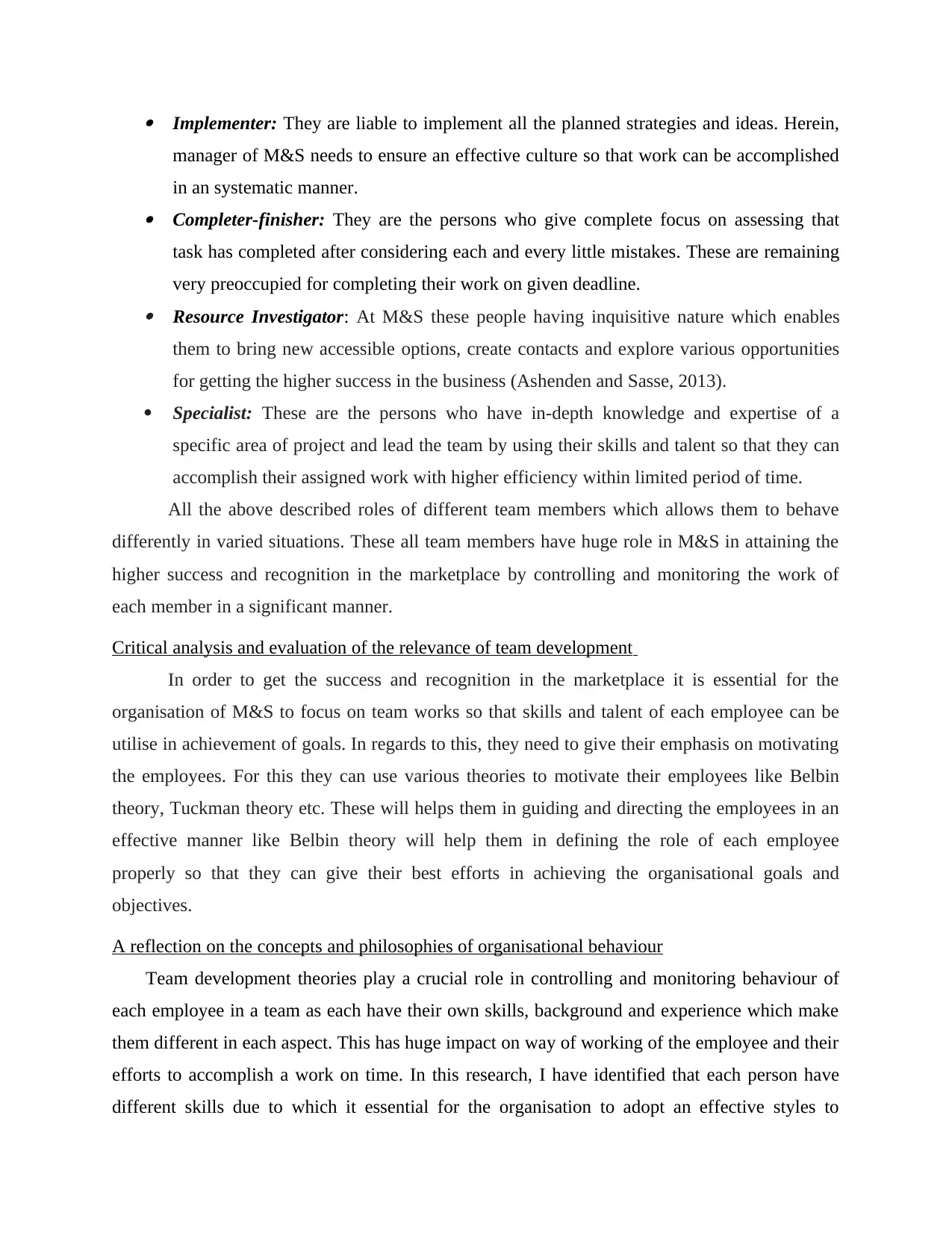
Implementer: They are liable to implement all the planned strategies and ideas. Herein,
manager of M&S needs to ensure an effective culture so that work can be accomplished
in an systematic manner. Completer-finisher: They are the persons who give complete focus on assessing that
task has completed after considering each and every little mistakes. These are remaining
very preoccupied for completing their work on given deadline. Resource Investigator: At M&S these people having inquisitive nature which enables
them to bring new accessible options, create contacts and explore various opportunities
for getting the higher success in the business (Ashenden and Sasse, 2013).
Specialist: These are the persons who have in-depth knowledge and expertise of a
specific area of project and lead the team by using their skills and talent so that they can
accomplish their assigned work with higher efficiency within limited period of time.
All the above described roles of different team members which allows them to behave
differently in varied situations. These all team members have huge role in M&S in attaining the
higher success and recognition in the marketplace by controlling and monitoring the work of
each member in a significant manner.
Critical analysis and evaluation of the relevance of team development
In order to get the success and recognition in the marketplace it is essential for the
organisation of M&S to focus on team works so that skills and talent of each employee can be
utilise in achievement of goals. In regards to this, they need to give their emphasis on motivating
the employees. For this they can use various theories to motivate their employees like Belbin
theory, Tuckman theory etc. These will helps them in guiding and directing the employees in an
effective manner like Belbin theory will help them in defining the role of each employee
properly so that they can give their best efforts in achieving the organisational goals and
objectives.
A reflection on the concepts and philosophies of organisational behaviour
Team development theories play a crucial role in controlling and monitoring behaviour of
each employee in a team as each have their own skills, background and experience which make
them different in each aspect. This has huge impact on way of working of the employee and their
efforts to accomplish a work on time. In this research, I have identified that each person have
different skills due to which it essential for the organisation to adopt an effective styles to
manager of M&S needs to ensure an effective culture so that work can be accomplished
in an systematic manner. Completer-finisher: They are the persons who give complete focus on assessing that
task has completed after considering each and every little mistakes. These are remaining
very preoccupied for completing their work on given deadline. Resource Investigator: At M&S these people having inquisitive nature which enables
them to bring new accessible options, create contacts and explore various opportunities
for getting the higher success in the business (Ashenden and Sasse, 2013).
Specialist: These are the persons who have in-depth knowledge and expertise of a
specific area of project and lead the team by using their skills and talent so that they can
accomplish their assigned work with higher efficiency within limited period of time.
All the above described roles of different team members which allows them to behave
differently in varied situations. These all team members have huge role in M&S in attaining the
higher success and recognition in the marketplace by controlling and monitoring the work of
each member in a significant manner.
Critical analysis and evaluation of the relevance of team development
In order to get the success and recognition in the marketplace it is essential for the
organisation of M&S to focus on team works so that skills and talent of each employee can be
utilise in achievement of goals. In regards to this, they need to give their emphasis on motivating
the employees. For this they can use various theories to motivate their employees like Belbin
theory, Tuckman theory etc. These will helps them in guiding and directing the employees in an
effective manner like Belbin theory will help them in defining the role of each employee
properly so that they can give their best efforts in achieving the organisational goals and
objectives.
A reflection on the concepts and philosophies of organisational behaviour
Team development theories play a crucial role in controlling and monitoring behaviour of
each employee in a team as each have their own skills, background and experience which make
them different in each aspect. This has huge impact on way of working of the employee and their
efforts to accomplish a work on time. In this research, I have identified that each person have
different skills due to which it essential for the organisation to adopt an effective styles to
Paraphrase This Document
Need a fresh take? Get an instant paraphrase of this document with our AI Paraphraser
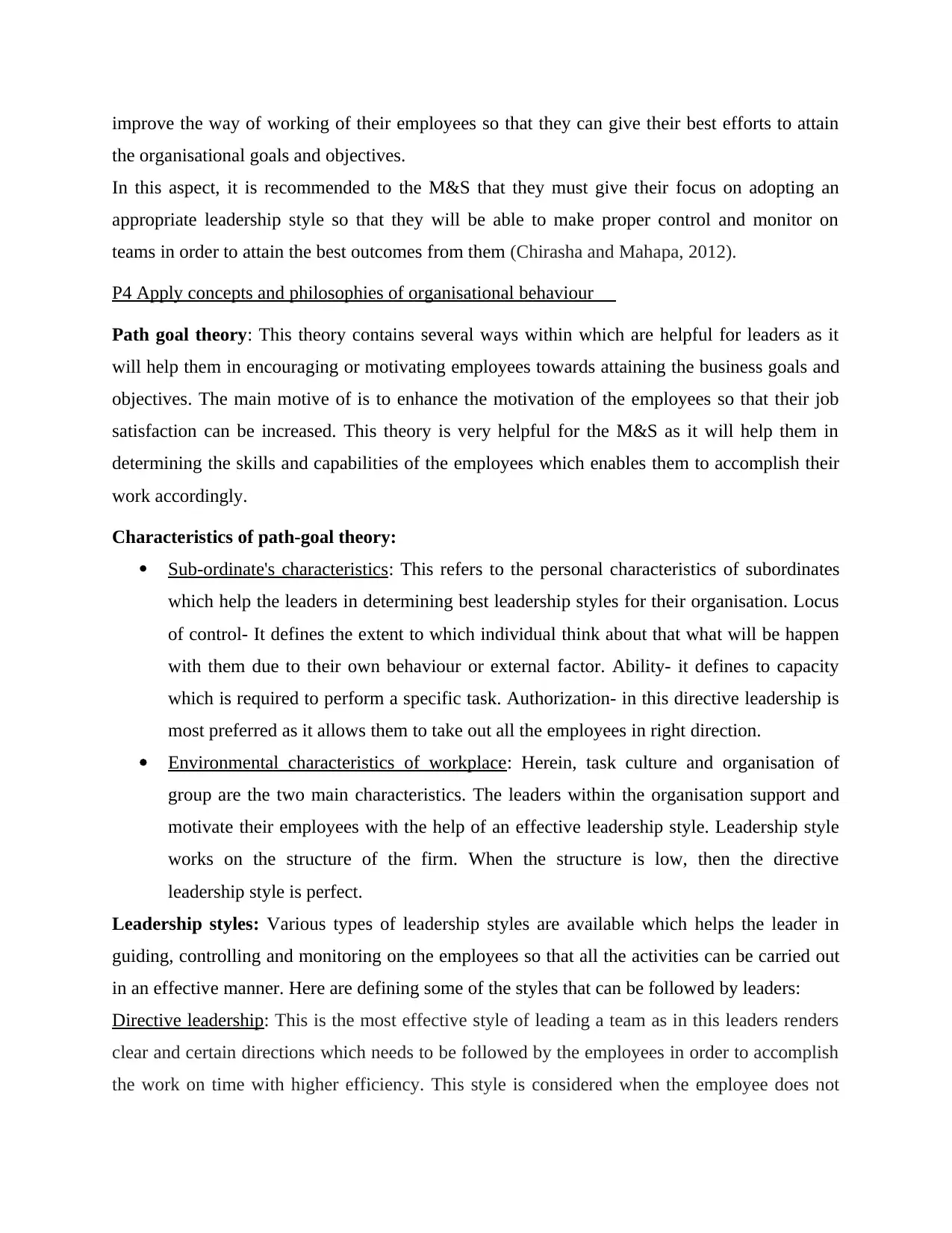
improve the way of working of their employees so that they can give their best efforts to attain
the organisational goals and objectives.
In this aspect, it is recommended to the M&S that they must give their focus on adopting an
appropriate leadership style so that they will be able to make proper control and monitor on
teams in order to attain the best outcomes from them (Chirasha and Mahapa, 2012).
P4 Apply concepts and philosophies of organisational behaviour
Path goal theory: This theory contains several ways within which are helpful for leaders as it
will help them in encouraging or motivating employees towards attaining the business goals and
objectives. The main motive of is to enhance the motivation of the employees so that their job
satisfaction can be increased. This theory is very helpful for the M&S as it will help them in
determining the skills and capabilities of the employees which enables them to accomplish their
work accordingly.
Characteristics of path-goal theory:
Sub-ordinate's characteristics: This refers to the personal characteristics of subordinates
which help the leaders in determining best leadership styles for their organisation. Locus
of control- It defines the extent to which individual think about that what will be happen
with them due to their own behaviour or external factor. Ability- it defines to capacity
which is required to perform a specific task. Authorization- in this directive leadership is
most preferred as it allows them to take out all the employees in right direction.
Environmental characteristics of workplace: Herein, task culture and organisation of
group are the two main characteristics. The leaders within the organisation support and
motivate their employees with the help of an effective leadership style. Leadership style
works on the structure of the firm. When the structure is low, then the directive
leadership style is perfect.
Leadership styles: Various types of leadership styles are available which helps the leader in
guiding, controlling and monitoring on the employees so that all the activities can be carried out
in an effective manner. Here are defining some of the styles that can be followed by leaders:
Directive leadership: This is the most effective style of leading a team as in this leaders renders
clear and certain directions which needs to be followed by the employees in order to accomplish
the work on time with higher efficiency. This style is considered when the employee does not
the organisational goals and objectives.
In this aspect, it is recommended to the M&S that they must give their focus on adopting an
appropriate leadership style so that they will be able to make proper control and monitor on
teams in order to attain the best outcomes from them (Chirasha and Mahapa, 2012).
P4 Apply concepts and philosophies of organisational behaviour
Path goal theory: This theory contains several ways within which are helpful for leaders as it
will help them in encouraging or motivating employees towards attaining the business goals and
objectives. The main motive of is to enhance the motivation of the employees so that their job
satisfaction can be increased. This theory is very helpful for the M&S as it will help them in
determining the skills and capabilities of the employees which enables them to accomplish their
work accordingly.
Characteristics of path-goal theory:
Sub-ordinate's characteristics: This refers to the personal characteristics of subordinates
which help the leaders in determining best leadership styles for their organisation. Locus
of control- It defines the extent to which individual think about that what will be happen
with them due to their own behaviour or external factor. Ability- it defines to capacity
which is required to perform a specific task. Authorization- in this directive leadership is
most preferred as it allows them to take out all the employees in right direction.
Environmental characteristics of workplace: Herein, task culture and organisation of
group are the two main characteristics. The leaders within the organisation support and
motivate their employees with the help of an effective leadership style. Leadership style
works on the structure of the firm. When the structure is low, then the directive
leadership style is perfect.
Leadership styles: Various types of leadership styles are available which helps the leader in
guiding, controlling and monitoring on the employees so that all the activities can be carried out
in an effective manner. Here are defining some of the styles that can be followed by leaders:
Directive leadership: This is the most effective style of leading a team as in this leaders renders
clear and certain directions which needs to be followed by the employees in order to accomplish
the work on time with higher efficiency. This style is considered when the employee does not
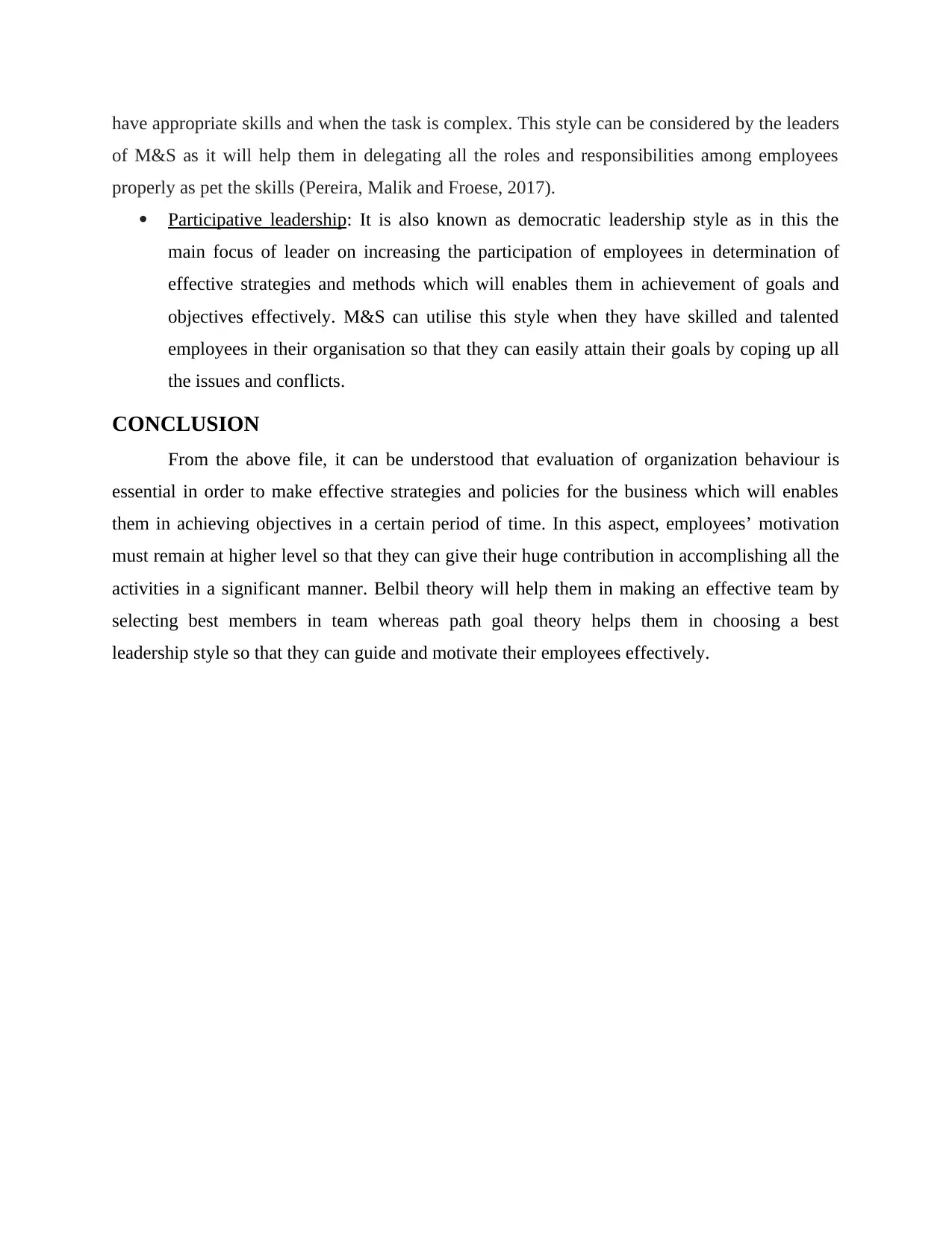
have appropriate skills and when the task is complex. This style can be considered by the leaders
of M&S as it will help them in delegating all the roles and responsibilities among employees
properly as pet the skills (Pereira, Malik and Froese, 2017).
Participative leadership: It is also known as democratic leadership style as in this the
main focus of leader on increasing the participation of employees in determination of
effective strategies and methods which will enables them in achievement of goals and
objectives effectively. M&S can utilise this style when they have skilled and talented
employees in their organisation so that they can easily attain their goals by coping up all
the issues and conflicts.
CONCLUSION
From the above file, it can be understood that evaluation of organization behaviour is
essential in order to make effective strategies and policies for the business which will enables
them in achieving objectives in a certain period of time. In this aspect, employees’ motivation
must remain at higher level so that they can give their huge contribution in accomplishing all the
activities in a significant manner. Belbil theory will help them in making an effective team by
selecting best members in team whereas path goal theory helps them in choosing a best
leadership style so that they can guide and motivate their employees effectively.
of M&S as it will help them in delegating all the roles and responsibilities among employees
properly as pet the skills (Pereira, Malik and Froese, 2017).
Participative leadership: It is also known as democratic leadership style as in this the
main focus of leader on increasing the participation of employees in determination of
effective strategies and methods which will enables them in achievement of goals and
objectives effectively. M&S can utilise this style when they have skilled and talented
employees in their organisation so that they can easily attain their goals by coping up all
the issues and conflicts.
CONCLUSION
From the above file, it can be understood that evaluation of organization behaviour is
essential in order to make effective strategies and policies for the business which will enables
them in achieving objectives in a certain period of time. In this aspect, employees’ motivation
must remain at higher level so that they can give their huge contribution in accomplishing all the
activities in a significant manner. Belbil theory will help them in making an effective team by
selecting best members in team whereas path goal theory helps them in choosing a best
leadership style so that they can guide and motivate their employees effectively.
⊘ This is a preview!⊘
Do you want full access?
Subscribe today to unlock all pages.

Trusted by 1+ million students worldwide
1 out of 14
Related Documents
Your All-in-One AI-Powered Toolkit for Academic Success.
+13062052269
info@desklib.com
Available 24*7 on WhatsApp / Email
![[object Object]](/_next/static/media/star-bottom.7253800d.svg)
Unlock your academic potential
Copyright © 2020–2026 A2Z Services. All Rights Reserved. Developed and managed by ZUCOL.




